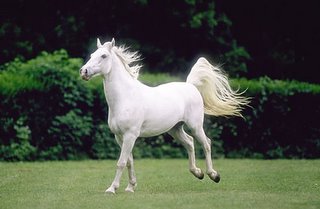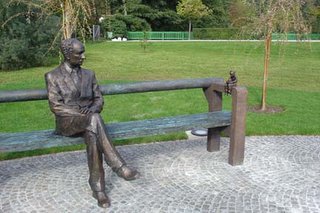
There’s a famous scene in the movie “Crimson Tide” where Gene Hackman and Denzel Washington argue on the origin of the famous Lipizzaner horses. Hackman’s character says they’re from Portugal, while Denzel Washington claims they’re Spanish. Neither of them is right, of course. The Lipizzaner come from Slovenia. They originate from a little village called Lipica (Lipizza in Italian spelling), in the vicinity of Trieste (known as Trst in Slovene), just a couple of kilometers from the border with Italy.
No wonder the movie, which ends with Hackman admitting he was wrong and aknowleding Lipizzaners are in fact from Spain (!), infuriated many Slovenes. Although it was the Spanish Riding School from Vienna that made these horses world famous, the Lipizzaners have become, expecially in the last half century, one of the symbols of Slovenia. As a matter of fact, they will be depicted on the Slovenian 20 cent Euro coin.
Lipizzaners are considered to be among the most beautiful horses. They are renowned for their agility and grace. They are famous for being born completely black and then growing up to be completely white.
The first who elevated this animal to a symbol of Slovenes, was the poet Edvard Kocbek (1904-1981). In the mid-seventies he wrote this beautiful poem after a visit to the village of Lipica where the horses are still bred. There's my translation of the poem from Slovene.
The Lipizzaners (Lipicanci)
The newspaper reports:
Lipizzaners have taken part
In a historical film.
The radio explains:
A millionaire bought some Lipizzaners,
The noble animals remained calm
Throughout the flight over the Atlantic.
And the textbook teaches:
Lipizzaners are grateful riding horses,
They are native from the Karst, of supple hoof,
Gaudily trot, sharp temper
And a stubborn fidelity.
And yet I have to add, my son,
That these uneasy animals
Cannot be put into fixed formulas:
It is good when the day shines,
Lipizzaners are black stallions,
And it is good when the night reigns,
Lipizzaner are white mares,
But the best is when
The day comes out of the night,
Then Lipizzaners are white-black buffoons,
Court jesters of Her Majesty,
The History of Slovenes.
Others have worshiped holy cows and dragons,
Millennial turtles and winged lions,
Unicorns, double-headed eagles and Phoenixes,
But we have chosen the most beautiful animal,
It has proven itself on battlefields and circuses,
It has conveyed princesses and the Golden Monstrance,
Therefore the Emperors from Vienna spoke
French with skilful diplomats,
Italian with beautiful actresses,
Spanish with the infinite God,
And German with uneducated servants,
But with horses they talked Slovene.
Remember, kid, how mysteriously
Nature and the History of the World are bound together,
And how different is the spring of spirit
In each of the nations on the Earth.
You know well that we are a land of contests and races.
You thus understand why the white horses
From Noah's ark found refuge on our pure soil,
Why have they become our holy animal,
Why have they stepped into the legend of history,
And why they stir up our future,
They incessantly search for our promised land
And are becoming the enthusiastic saddle of our spirit.
I am constantly on the white-black horse,
My beloved son,
Like a Bedouin chief
I am blend with my animal,
All my life I've been traveling on it,
I fight on a horse and I pray on him,
I sleep on a horse and I dream on a horse,
And I shall die on a horse.
I learned all our prophecies
On the mysterious animal,
And I've experienced this song, too,
On its trembling back.
Nothing is darker
Than clear speech
And nothing is more true than a poem
That cannot be comprehended by reason.
Heroes limp in the bright Sun,
And sages stammer in the dark,
While jokers are changing into poets,
Winged Pegasi are speeding up in gallop
Over the cavities of our old land,
They are jumping and pounding,
The anxious Slovene animals
Are still trying to awake the legendary King Mathias.
He who still cannot mount a horse,
Should learn as soon as possible
How to tame the fiery animal,
To freely keep in the light saddle,
And to catch the rhythm of the trot.
But above all to endure in the premonition,
For our horses have come galloping from far away,
And they are destined to far distances.
Engines tend to fail,
Elephants eat too much,
Our road is a long one, though,
And it is too far to walk.
The first who elevated this animal to a symbol of Slovenes, was the poet Edvard Kocbek (1904-1981). In the mid-seventies he wrote this beautiful poem after a visit to the village of Lipica where the horses are still bred. There's my translation of the poem from Slovene.
The Lipizzaners (Lipicanci)
The newspaper reports:
Lipizzaners have taken part
In a historical film.
The radio explains:
A millionaire bought some Lipizzaners,
The noble animals remained calm
Throughout the flight over the Atlantic.
And the textbook teaches:
Lipizzaners are grateful riding horses,
They are native from the Karst, of supple hoof,
Gaudily trot, sharp temper
And a stubborn fidelity.
And yet I have to add, my son,
That these uneasy animals
Cannot be put into fixed formulas:
It is good when the day shines,
Lipizzaners are black stallions,
And it is good when the night reigns,
Lipizzaner are white mares,
But the best is when
The day comes out of the night,
Then Lipizzaners are white-black buffoons,
Court jesters of Her Majesty,
The History of Slovenes.
Others have worshiped holy cows and dragons,
Millennial turtles and winged lions,
Unicorns, double-headed eagles and Phoenixes,
But we have chosen the most beautiful animal,
It has proven itself on battlefields and circuses,
It has conveyed princesses and the Golden Monstrance,
Therefore the Emperors from Vienna spoke
French with skilful diplomats,
Italian with beautiful actresses,
Spanish with the infinite God,
And German with uneducated servants,
But with horses they talked Slovene.
Remember, kid, how mysteriously
Nature and the History of the World are bound together,
And how different is the spring of spirit
In each of the nations on the Earth.
You know well that we are a land of contests and races.
You thus understand why the white horses
From Noah's ark found refuge on our pure soil,
Why have they become our holy animal,
Why have they stepped into the legend of history,
And why they stir up our future,
They incessantly search for our promised land
And are becoming the enthusiastic saddle of our spirit.
I am constantly on the white-black horse,
My beloved son,
Like a Bedouin chief
I am blend with my animal,
All my life I've been traveling on it,
I fight on a horse and I pray on him,
I sleep on a horse and I dream on a horse,
And I shall die on a horse.
I learned all our prophecies
On the mysterious animal,
And I've experienced this song, too,
On its trembling back.
Nothing is darker
Than clear speech
And nothing is more true than a poem
That cannot be comprehended by reason.
Heroes limp in the bright Sun,
And sages stammer in the dark,
While jokers are changing into poets,
Winged Pegasi are speeding up in gallop
Over the cavities of our old land,
They are jumping and pounding,
The anxious Slovene animals
Are still trying to awake the legendary King Mathias.
He who still cannot mount a horse,
Should learn as soon as possible
How to tame the fiery animal,
To freely keep in the light saddle,
And to catch the rhythm of the trot.
But above all to endure in the premonition,
For our horses have come galloping from far away,
And they are destined to far distances.
Engines tend to fail,
Elephants eat too much,
Our road is a long one, though,
And it is too far to walk.
